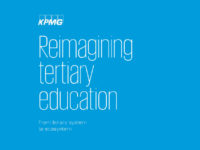A report from the management consulting company KPMG has recommended sweeping changes to Australia’s post-secondary education system.
The report, entitled Reimagining Tertiary Education: From binary system to ecosystem, says Australia “needs a new mindset”, and that we must “move beyond an unstable and outmoded distinction between higher education and VET”. These report’s recommendations include creating a national tertiary education system with the Australian Qualifications Framework at its centre, a unified funding framework, greater funding transparency and accountability, an independent tertiary pricing authority, a unified tertiary education loans scheme, tightened VET regulation, recognising excellence in teaching, improving information on tertiary education outcomes and removing higher education provider categories.
The recommendations have been hotly debated in the media, including The Guardian, The Australian, the Sydney Morning Herald and many others. Universities Australia has derided the report, saying, “Any policy change that undermines the strength and quality of our university system would be an economic own goal that would undermine our attractiveness to international students.”
Commenting on the vocational education and training sector, the report’s lead author Professor Stephen Parker AO writes:
“A reversal in the trend of declining public support for the vocational education and training sector is both socially and economically justified, and would help to ease Australia’s chronic labour market shortage of technicians and trade workers. But regulation must be tightened to ensure that all registered training organisations are of high quality and committed to the mission of education and training.”
Writing in the Australian (8 August), co-author Andrew Dempster says of Australian VET:
“Student demand has been highly variable and, of late, in decline. There is a confusion of responsibility between federal, state and territory governments. The different levels of government often have acted independently, rather than in concert. As a consequence, funding for VET has been unstable, subject to cycles of boom and bust, and more susceptible to political decision-making. We should not let this state of affairs continue.”
Professor Parker to speak at CCA Conference in November
Professor Parker, a former Vice Chancellor of the University of Canberra, will be a keynote speaker at CCA’s Annual Conference in Sydney, on 14 November 2018. He will discuss the implications of the report for Australian adult and community education providers.
CCA Comment
CCA CEO, Dr Don Perlgut, has welcomed the release of the report, noting:
“We are pleased that an organisation with the credibility of KPMG has taken the lead to point out the second class citizenship status of Australian VET. They have also noted the importance of regional Australia, dealing with thin markets, providing community service obligation funding and how national government leadership and support is essential in creating a fairer post-secondary education system.
“The report is strong on recognising both the private and the public benefits of tertiary education. We feel that the dial has swung way too far towards regarding post-secondary education as a market with individuals simply buying their needed (desired) qualifications. The report correctly states that more education supports economic growth, improved living standards as well as broader benefits to the public and society.
“We caution that, like most reports on Australia’s national education system, this one does not take account of the vital contributions of the not-for-profit community education VET providers. Although the report is strong on strengthening VET regulation – which we support – we would like to see more commitment to ensuring that Australia’s higher education system does not further privatise. Some of the recommendations – especially on student loans – if undertaken without due care, could strengthen private for-profit providers and weaken public and community providers.
“The report shows a deep understanding of the difficulties in understanding how Certificate I through IV is delivered and funded (‘opaque’ and differing between the states) in Australia, however only deals with the lower levels – Certificate I and II – on a broad brush level. CCA believes that extra policy attention is strongly needed to basic and foundation skills, and that literacy and numeracy must be treated differently from higher education qualifications. Although there is a continuum, the style and type of teaching and delivery is very different.
“CCA looks forward to welcoming Professor Parker to our November conference, and the opportunity to discuss Australia’s future education with him.”





